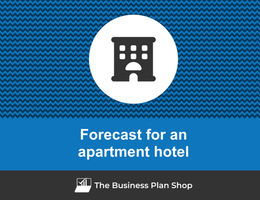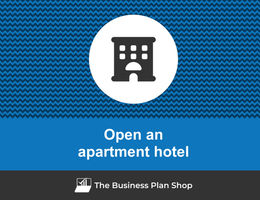How to write a business plan for an apartment hotel?
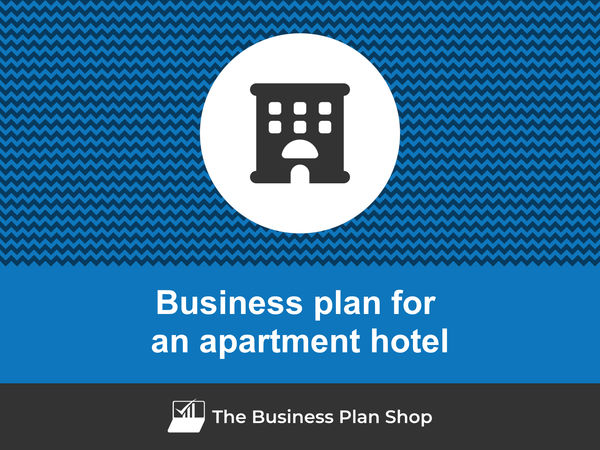
Putting together a business plan for an apartment hotel can be daunting - especially if you're creating a business for the first time - but with this comprehensive guide, you'll have the necessary tools to do it confidently.
We will explore why writing one is so important in both starting up and growing an existing apartment hotel, as well as what should go into making an effective plan - from its structure to content - and what tools can be used to streamline the process and avoid errors.
Without further ado, let us begin!
Why write a business plan for an apartment hotel?
Being clear on the scope and goals of the document will make it easier to understand its structure and content. So before diving into the actual content of the plan, let's have a quick look at the main reasons why you would want to write an apartment hotel business plan in the first place.
To have a clear roadmap to grow the business
Running a small business is tough! Economic cycles bring growth and recessions, while the business landscape is ever-changing with new technologies, regulations, competitors, and consumer behaviours emerging constantly.
In such a dynamic context, operating a business without a clear roadmap is akin to driving blindfolded: it's risky, to say the least. That's why crafting a business plan for your apartment hotel is vital to establish a successful and sustainable venture.
To create an effective business plan, you'll need to assess your current position (if you're already in business) and define where you want the business to be in the next three to five years.
Once you have a clear destination for your apartment hotel, you'll have to:
- Identify the necessary resources (human, equipment, and capital) needed to reach your goals,
- Determine the pace at which the business needs to progress to meet its objectives as scheduled,
- Recognize and address the potential risks you may encounter along the way.
Engaging in this process regularly proves advantageous for both startups and established companies. It empowers you to make informed decisions about resource allocation, ensuring the long-term success of your business.
To anticipate future cash flows
Regularly comparing your actual financial performance to the projections in the financial forecast of your apartment hotel's business plan gives you the ability to monitor your business's financial health and make necessary adjustments as needed.
This practice allows you to detect potential financial issues, such as unexpected cash shortfalls before they escalate into major problems. Giving you time to find additional financing or put in place corrective measures.
Additionally, it helps you identify growth opportunities, like excess cash flow that could be allocated to launch new products and services or expand into new markets.
Staying on track with these regular comparisons enables you to make well-informed decisions about the amount of financing your business might require, or the excess cash flow you can expect to generate from your main business activities.
To secure financing
Whether you are a startup or an existing business, writing a detailed apartment hotel business plan is essential when seeking financing from banks or investors.
This makes sense given what we've just seen: financiers want to ensure you have a clear roadmap and visibility on your future cash flows.
Banks will use the information included in the plan to assess your borrowing capacity (how much debt your business can support) and your ability to repay the loan before deciding whether they will extend credit to your business and on what terms.
Similarly, investors will review your plan carefully to assess if their investment can generate an attractive return on investment.
To do so, they will be looking for evidence that your apartment hotel has the potential for healthy growth, profitability, and cash flow generation over time.
Now that you understand why it is important to create a business plan for an apartment hotel, let's take a look at what information is needed to create one.
Need a convincing business plan?
The Business Plan Shop makes it easy to create a financial forecast to assess the potential profitability of your projects, and write a business plan that’ll wow investors.

What information is needed to create a business plan for an apartment hotel?
Writing an apartment hotel business plan requires research so that you can project sales, investments and cost accurately in your financial forecast.
In this section, we cover three key pieces of information you should gather before drafting your business plan!
Carrying out market research for an apartment hotel
Carrying out market research before writing a business plan for an apartment hotel is essential to ensure that the financial projections are accurate and realistic.
Market research helps you gain insight into your target customer base, competitors, pricing strategies and other key factors which can have an impact on the commercial success of your business.
In particular, it is useful in forecasting revenue as it provides valuable data regarding potential customers’ spending habits and preferences.
You could find that potential guests may be more likely to value convenience and affordability when selecting an apartment hotel. Additionally, market research may reveal that guests might prefer more modern amenities and services, such as access to a fitness center or on-site restaurant.
This information can then be used to create more accurate financial projections which will help investors make informed decisions about investing in your apartment hotel.
Developing the sales and marketing plan for an apartment hotel
Budgeting sales and marketing expenses is essential before creating an apartment hotel business plan.
A comprehensive sales and marketing plan should provide an accurate projection of what actions need to be implemented to acquire and retain customers, how many people are needed to carry out these initiatives, and how much needs to be spent on promotions, advertising, and other aspects.
This helps ensure that the right amount of resources is allocated to these activities in order to hit the sales and growth objectives forecasted in your business plan.
The staffing and equipment needs of an apartment hotel
Whether you are at the beginning stages of your apartment hotel or expanding its horizons, having a clear plan for recruitment and capital expenditures (investment in equipment and real estate) is vital to ensure your business's success.
To achieve this, both the recruitment and investment plans must align coherently with the projected timing and level of growth in your forecast. It is essential to secure appropriate funding for these plans.
An apartment hotel might incur staffing costs for a receptionist, housekeeping staff, and maintenance personnel.
The hotel might also incur costs for equipment such as furniture, linens, cleaning supplies, and other necessary items.
Additionally, the hotel might have to purchase computer systems and software for the management and reservation systems.
To create a financial forecast that accurately represents your business's outlook, remember to factor in other day-to-day operating expenses.
Now that you have all the necessary information, it's time to dive in and start creating your business plan and developing the financial forecast for your apartment hotel.
What goes into your apartment hotel's financial forecast?
The financial forecast of your apartment hotel's business plan will enable you to assess the growth, profitability, funding requirements, and cash generation potential of your business in the coming years.
The four key outputs of a financial forecast for a apartment hotel are:
- The profit and loss (P&L) statement,
- The projected balance sheet,
- The cash flow forecast,
- And the sources and uses table.
Let's look at each of these in a bit more detail.
The projected P&L statement
Your apartment hotel forecasted P&L statement enables the reader of your business plan to get an idea of how much revenue and profits your business is expected to make in the near future.
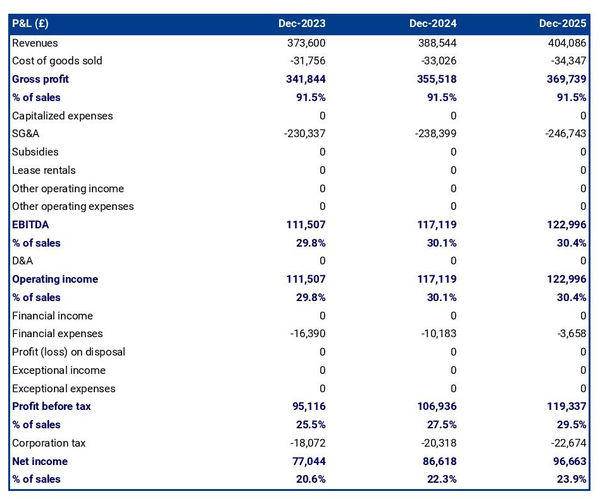
Ideally, your reader will want to see:
- Growth above the inflation level
- Expanding profit margins
- Positive net profit throughout the plan
Expectations for an established apartment hotel will of course be different than for a startup. Existing businesses which have reached their cruising altitude might have slower growth and higher margins than ventures just being started.
The forecasted balance sheet of your apartment hotel
The projected balance sheet of your apartment hotel will enable the reader of your business plan to assess the overall financial health of your business.
It shows three elements: assets, liabilities and equity:
- Assets: are productive resources owned by the business, such as equipment, cash, and accounts receivable (money owed by clients).
- Liabilities: are debts owed to creditors, lenders, and other entities, such as accounts payable (money owed to suppliers).
- Equity: includes the sums invested by the shareholders or business owners and the profits and losses accumulated by the business to date (which are called retained earnings). It is a proxy for the value of the owner's stake in the business.
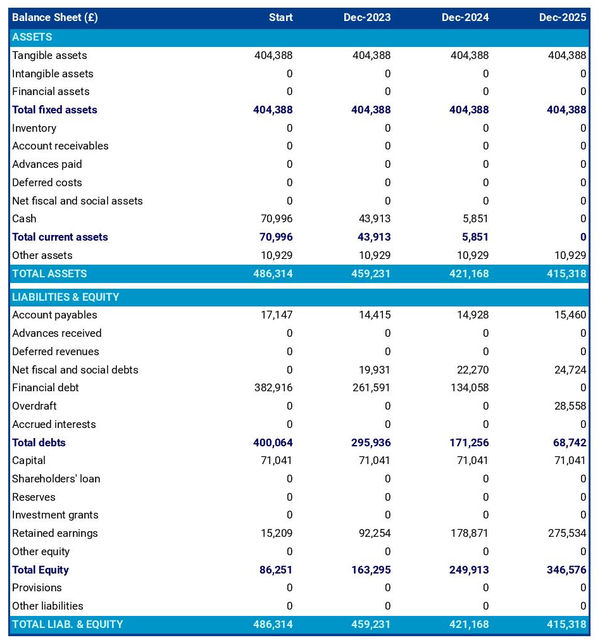
Analysing your apartment hotel projected balance sheet provides an understanding of your apartment hotel's working capital structure, investment and financing policies.
In particular, the readers of your plan can compare the level of financial debt on the balance sheet to the equity value to measure the level of financial risk (equity doesn't need to be reimbursed, while financial debt must be repaid, making it riskier).
They can also use your balance sheet to assess your apartment hotel's liquidity and solvency:
- A liquidity analysis: focuses on whether or not your business has sufficient cash and short-term assets to cover its liabilities due in the next 12 months.
- A solvency analysis: takes and longer view to assess whether or not your business has the capacity to repay its debts over the medium-term.
The cash flow forecast
A projected cash flow statement for an apartment hotel is used to show how much cash the business is generating or consuming.
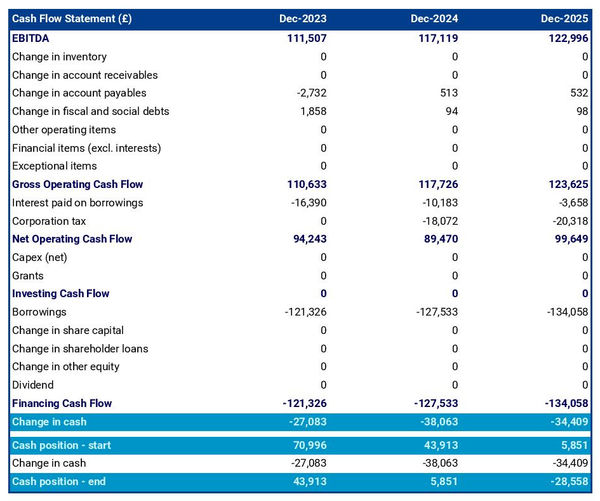
The cash flow forecast is usually organized by nature to show three key metrics:
- The operating cash flow: do the core business activities generate or consume cash?
- The investing cash flow: how much is the business investing in long-term assets (this is usually compared to the level of fixed assets on the balance sheet to assess whether the business is regularly maintaining and renewing its equipment)?
- The financing cash flow: is the business raising new financing or repaying financiers (debt repayment, dividends)?
As we discussed earlier, cash is king and keeping an eye on future cash flows an imperative for running a successful business. Therefore, you can expect the reader of your apartment hotel business plan to pay close attention to your cash flow forecast.
Also, note that it is customary to provide both yearly and monthly cash flow forecasts in a business plan - so that the reader can analyze seasonal variation and ensure the apartment hotel is appropriately funded.
The initial financing plan
The sources and uses table or initial financing plan is a key component of your business plan when starting an apartment hotel.
It shows where the capital needed to set up the business will come from (sources) and how it will be spent (uses).

This table helps size the investment required to set up the apartment hotel, and understand how risks will be distributed between the business owners, and the financiers.
The sources and uses table also highlights what the starting cash position will be. This is key for startups as the business needs to have sufficient funding to sustain operations until the break-even point is reached.
Now that you have a clear understanding of what will go into the financial forecast of your apartment hotel business plan, let's have a look at the written part of the plan.
Need a convincing business plan?
The Business Plan Shop makes it easy to create a financial forecast to assess the potential profitability of your projects, and write a business plan that’ll wow investors.

The written part of an apartment hotel business plan
The written part of an apartment hotel business plan plays a key role: it lays out the plan of action you intend to execute to seize the commercial opportunity you've identified on the market and provides the context needed for the reader to decide if they believe your plan to be achievable and your financial forecast to be realistic.
The written part of an apartment hotel business plan is composed of 7 main sections:
- The executive summary
- The presentation of the company
- The products and services
- The market analysis
- The strategy
- The operations
- The financial plan
Let's go through the content of each section in more detail!
1. The executive summary
The executive summary, the first section of your apartment hotel's business plan, serves as an inviting snapshot of your entire plan, leaving readers eager to know more about your business.
To compose an effective executive summary, start with a concise introduction of your business, covering its name, concept, location, history, and unique aspects. Share insights about the services or products you intend to offer and your target customer base.
Subsequently, provide an overview of your apartment hotel's addressable market, highlighting current trends and potential growth opportunities.
Then, present a summary of critical financial figures, such as projected revenues, profits, and cash flows.
You should then include a summary of your key financial figures such as projected revenues, profits, and cash flows.
Lastly, address any funding needs in the "ask" section of your executive summary.
2. The presentation of the company
In your apartment hotel business plan, the second section should focus on the structure and ownership, location, and management team of your company.
In the structure and ownership part, you'll provide an overview of the business's legal structure, details about the owners, and their respective investments and ownership shares. This clarity is crucial, especially if you're seeking financing, as it helps the reader understand which legal entity will receive the funds and who controls the business.
Moving on to the location part, you'll offer an overview of the company's premises and their surroundings. Explain why this particular location is of interest, highlighting factors like catchment area, accessibility, and nearby amenities.
When describing the location of your apartment hotel, you could emphasize its proximity to a variety of amenities and attractions.
It may be close to shopping, dining, and entertainment, and could also be a short distance from public transportation and highways.
You could also highlight any parks, beaches, or other outdoor attractions nearby. Finally, you could emphasize the area's potential for growth, which could be attractive to any potential financier.
Finally, you should introduce your management team. Describe each member's role, background, and experience.
Don't forget to emphasize any past successes achieved by the management team and how long they've been working together. Demonstrating their track record and teamwork will help potential lenders or investors gain confidence in their leadership and ability to execute the business plan.
3. The products and services section
The products and services section of your business plan should include a detailed description of the offerings that your company provides to its customers.
For example, your apartment hotel might offer amenities such as high-speed internet, a full kitchen, and a 24-hour concierge service to ensure guests have access to all the services they need.
Additionally, the hotel could offer laundry and dry-cleaning services for convenience, as well as a fitness centre, pool, and spa to help guests relax.
Furthermore, your hotel could offer a variety of activities and tourist information to help guests explore the local area. These services provide guests with all the comforts of home while allowing them to enjoy their stay in the hotel.
When drafting this section, you should be precise about the categories of products or services you sell, the types of customers you are targeting and how customers can buy them.
4. The market analysis
When outlining your market analysis in the apartment hotel business plan, it's essential to include comprehensive details about customers' demographics and segmentation, target market, competition, barriers to entry, and relevant regulations.
The primary aim of this section is to give the reader an understanding of the market size and appeal while demonstrating your expertise in the industry.
To begin, delve into the demographics and segmentation subsection, providing an overview of the addressable market for your apartment hotel, key marketplace trends, and introducing various customer segments and their preferences in terms of purchasing habits and budgets.
Next, shift your focus to the target market subsection, where you can zoom in on the specific customer segments your apartment hotel targets. Explain how your products and services are tailored to meet the unique needs of these customers.
For example, your target market might include busy professionals looking for a short-term place to stay.
These individuals often travel for work and may prefer the convenience of a hotel-style apartment with amenities such as a kitchenette and a fitness centre.
They may also need to stay in the same location for an extended period, making apartment hotels the perfect place to stay.
In the competition subsection, introduce your main competitors and explain what sets your apartment hotel apart from them.
Finally, round off your market analysis by providing an overview of the main regulations that apply to your apartment hotel.
5. The strategy section
When writing the strategy section of a business plan for your apartment hotel, it is essential to include information about your competitive edge, pricing strategy, sales & marketing plan, milestones, and risks and mitigants.
The competitive edge subsection should explain what sets your company apart from its competitors. This part is especially key if you are writing the business plan of a startup, as you have to make a name for yourself in the marketplace against established players.
The pricing strategy subsection should demonstrate how you intend to remain profitable while still offering competitive prices to your customers.
The sales & marketing plan should outline how you intend to reach out and acquire new customers, as well as retain existing ones with loyalty programs or special offers.
The milestones subsection should outline what your company has achieved to date, and its main objectives for the years to come - along with dates so that everyone involved has clear expectations of when progress can be expected.
The risks and mitigants subsection should list the main risks that jeopardize the execution of your plan and explain what measures you have taken to minimize these. This is essential in order for investors or lenders to feel secure in investing in your venture.
Your apartment hotel faces the risk of theft and vandalism. Guests may leave items of value in their rooms or common areas, which could be stolen by an intruder. Additionally, guests may damage property in their rooms or in common areas, resulting in costly repairs. It is also possible for guests to cause a disturbance within the hotel or even in the neighborhood, leading to a negative public perception of your hotel.
6. The operations section
In your business plan, it's also essential to provide a detailed overview of the operations of your apartment hotel.
Start by covering your team, highlighting key roles and your recruitment plan to support the expected growth. Outline the qualifications and experience required for each role and your intended recruitment methods, whether through job boards, referrals, or headhunters.
Next, clearly state your apartment hotel's operating hours, allowing the reader to assess staffing levels adequately. Additionally, mention any plans for varying opening times during peak seasons and how you'll handle customer queries outside normal operating hours.
Then, shift your focus to the key assets and intellectual property (IP) necessary for your business. If you rely on licenses, trademarks, physical structures like equipment or property, or lease agreements, make sure to include them in this section.
You could have key assets such as the building itself and the furnishings, as well as intellectual property such as the brand name and logo. The furnishings may include beds, bedding, and other furniture to create a comfortable environment for your guests. The brand name and logo could be used to differentiate your apartment hotel from other competitors and create a unique identity.
Lastly, include a list of suppliers you plan to work with, detailing their services and main commercial terms, such as price, payment terms, and contract duration. Investors are interested in understanding why you've chosen specific suppliers, which may be due to higher-quality products or established relationships from previous ventures.
7. The presentation of the financial plan
The financial plan section is where we will include the financial forecast we talked about earlier in this guide.
Now that you have a clear idea of the content of an apartment hotel business plan, let's look at some of the tools you can use to create yours.
What tool should I use to write my apartment hotel's business plan?
In this section, we will be reviewing the two main options for writing an apartment hotel business plan efficiently:
- Using specialized software,
- Outsourcing the drafting to the business plan writer.
Using an online business plan software for your apartment hotel's business plan
Using online business planning software is the most efficient and modern way to create an apartment hotel business plan.
There are several advantages to using specialized software:
- You can easily create your financial forecast by letting the software take care of the financial calculations for you without errors
- You are guided through the writing process by detailed instructions and examples for each part of the plan
- You can access a library of dozens of complete business plan samples and templates for inspiration
- You get a professional business plan, formatted and ready to be sent to your bank or investors
- You can easily track your actual financial performance against your financial forecast
- You can create scenarios to stress test your forecast's main assumptions
- You can easily update your forecast as time goes by to maintain visibility on future cash flows
- You have a friendly support team on standby to assist you when you are stuck
If you're interested in using this type of solution, you can try The Business Plan Shop for free by signing up here.
Need a convincing business plan?
The Business Plan Shop makes it easy to create a financial forecast to assess the potential profitability of your projects, and write a business plan that’ll wow investors.

Hiring a business plan writer to write your apartment hotel's business plan
Outsourcing your apartment hotel business plan to a business plan writer can also be a viable option.
Business plan writers are experienced in writing business plans and adept at creating financial forecasts without errors. Furthermore, hiring a consultant can save you time and allow you to focus on the day-to-day operations of your business.
However, hiring business plan writers is expensive as you are paying for the software used by the consultant, plus their time, and their profit margin of course.
From experience, you need to budget at least £1.5k ($2.0k) excluding tax for a complete business plan, more if you need to make changes after the initial version (which happens frequently after the initial meetings with lenders or investors).
You also need to be careful when seeking investment. Investors want their money to be used to grow the business, not spent on consulting fees. Therefore, the amount you spend on business plan writing services (and other consulting services such as legal services) needs to be negligible relative to the amount raised.
The other drawback is that you usually don't own the business plan itself: you just get the output, while the actual document is saved in the consultant's business plan software - which makes it difficult to maintain the document up to date without hiring the consultant on a retainer.
For these reasons, outsourcing the apartment hotel business plan to a business plan writer should be considered carefully, weighing both the advantages and disadvantages of hiring outside help.
Ultimately, it may be the right decision for some businesses, while others may find it beneficial to write their business plan using online software.
Why not create your apartment hotel's business plan using Word or Excel?
Using Microsoft Excel and Word (or their Google, Apple, or open-source equivalents) to write an apartment hotel business plan is a terrible idea.
Why?
For starters, creating an accurate and error-free financial forecast on Excel (or any spreadsheet) is very technical and requires both a strong grasp of accounting principles and solid skills in financial modelling.
As a result, it is unlikely anyone will trust your numbers unless - like us at The Business Plan Shop - you hold a degree in finance and accounting and have significant financial modelling experience in your past.
The second reason is that it is inefficient. Building forecasts on spreadsheets was the only option in the 1990s and early 2000s, nowadays technology has advanced and software can do it much faster and much more accurately.
And with the rise of AI, software is also becoming smarter at helping us detect mistakes in our forecasts and helping us analyse the numbers to make better decisions.
Also, using software makes it easy to compare actuals vs. forecasts and maintain our forecasts up to date to maintain visibility on future cash flows - as we discussed earlier in this guide - whereas this is a pain to do with a spreadsheet.
That's for the forecast, but what about the written part of my apartment hotel business plan?
This part is less error-prone, but here also software brings tremendous gains in productivity:
- Word processors don't include instructions and examples for each part of your business plan
- Word processors don't update your numbers automatically when they change in your forecast
- Word processors don't handle the formatting for you
- ...
Overall, while Word or Excel may be viable options for creating an apartment hotel business plan for some entrepreneurs, it is by far not the best or most efficient solution.
Takeaways
- Having an up-to-date business plan is key to maintaining visibility on your future cash flows.
- A business plan has 2 parts: a financial forecast highlighting the expected growth, profitability and cash generation of the business; and a written part which provides the context needed to interpret and assess the quality of the forecast.
- Using business plan software is the modern way of writing and maintaining business plans.
We hope that this guide helped you to better understand how to write the business plan for an apartment hotel. If you still have questions, do not hesitate to contact us.
Also on The Business Plan Shop
- How to write a 5 years business plan
- How to write the risks and mitigants section of your business plan?
- Pitch deck vs business plan
- Guide for a business plan for a supplier
- Business plan myths
Know someone who owns or wants to start an apartment hotel? Share this article with them!


